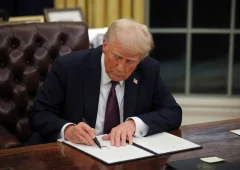U.S. Treasury Eliminates Crypto Reporting Rule Targeting Decentralized Exchanges
10.07.2025 17:57 1 min. read Kosta Gushterov
According to Bloomberg the U.S. Treasury Department has officially eliminated a controversial crypto reporting requirement that targeted decentralized exchanges.
This move follows Congress’s earlier decision to overturn the measure and President Donald Trump’s final approval in April.
The repealed regulation—listed as TD 10021, RIN 1545-BR39—was introduced under Section 6045. It aimed to force DeFi platforms to report detailed user transaction data to the IRS for tax purposes.
However, lawmakers raised concerns over the feasibility and fairness of such mandates. Republicans in Congress led the charge to rescind the rule under the Congressional Review Act, ultimately gaining Trump’s signature.
Industry concerns: DeFi and compliance don’t mix
Crypto supporters, including Bloomberg-cited policy analysts, argued that the rule was unworkable. Most decentralized exchanges operate without human oversight, making it nearly impossible to comply with traditional reporting requirements.
This rollback marks a significant win for the crypto industry, particularly those building within decentralized finance. It also underscores the ongoing regulatory divide between enforcement ambitions and the technical realities of Web3 platforms.
-
1
Japan Plans Major Crypto Reform with New Tax Rules and ETF Access
24.06.2025 20:00 2 min. read -
2
Gemini Launches Tokenized MicroStrategy Stock for EU Users
28.06.2025 9:30 2 min. read -
3
Here is When the U.S. House Will Vote on Key Crypto Bills
04.07.2025 12:00 2 min. read -
4
U.S. Crypto Investors Hit by IRS Letter Surge as Tax Crackdown Looms
29.06.2025 11:00 3 min. read -
5
Ripple Drops Cross-Appeal, Moves to End SEC Case “Once and for All”
28.06.2025 12:30 2 min. read
Senate Confirms Crypto-Linked Nominee Jonathan Gould to Head OCC
The U.S. Senate has confirmed Jonathan Gould as the next head of the Office of the Comptroller of the Currency (OCC), moving his nomination to President Donald Trump for final approval.
Australia Tests CBDCs in 24 Separate Real-World Finance Use Cases
Australia is stepping up its digital currency efforts with the next phase of Project Acacia, a pilot focused on testing central bank digital currency (CBDC) and tokenized finance in real-world applications.
U.S. Lawmakers Target El Salvador With Crypto Sanctions Plan
Three Democratic senators—Chris Van Hollen, Tim Kaine, and Alex Padilla—unveiled a bill aiming to penalize El Salvador’s President Nayib Bukele and his allies.
Crypto Tax Policy in Spotlight as House Plans July 16 Hearing
As U.S. lawmakers gear up for what’s being dubbed “Crypto Week,” the House of Representatives is turning its focus to a long-standing industry concern: taxation of digital assets.
-
1
Japan Plans Major Crypto Reform with New Tax Rules and ETF Access
24.06.2025 20:00 2 min. read -
2
Gemini Launches Tokenized MicroStrategy Stock for EU Users
28.06.2025 9:30 2 min. read -
3
Here is When the U.S. House Will Vote on Key Crypto Bills
04.07.2025 12:00 2 min. read -
4
U.S. Crypto Investors Hit by IRS Letter Surge as Tax Crackdown Looms
29.06.2025 11:00 3 min. read -
5
Ripple Drops Cross-Appeal, Moves to End SEC Case “Once and for All”
28.06.2025 12:30 2 min. read


